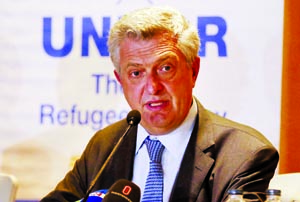
Staff Reporter :
United Nations High Commissioner for Refugees Filippo Grandi on Monday said that Rohingya refugee crisis has originated in Myanmar and the country must resolve it with safety and dignity of the Rohingyas.
“Only Myanmar has the solution to the Rohingya crisis as the issue has started from the country. It has to be decided by the Myanmar government. Otherwise, the Security Council’s intervention will be required, which he describes as a “complex exercise,” Grandi said this at a press briefing in a city hotel following a visit on Sunday to Kutupalong refugee camp and other areas along the border.
The UNCHR chief said, “We want safety in general in Rakhine State. Without that, the people will not be able to go back. People have lost everything. If there is no such guarantee of safety, they will not go back.”
Grandi said, “I agree with Bangladeshi Prime Minister Sheikh Hasina’s proposals to resolve the Rohingya crisis, but it is skeptical on a safe zone inside Myanmar for the Rohingyas.
Replying to a question of how the safety and dignity will be ensured, Grandi said, “There is no access of humanitarian organization in Myanmar. After return of the Rohingyas to Myanmar access of the humanitarian agencies must be ensured.” He also hoped that recommendations of Kofi Annan Commission will help resolve the crisis permanently.
The UNHCR chief called upon the global community to rapidly step up aid for Rohingya refugees who have fled to Bangladesh from Myanmar after brutality in the Rakhine State.
“More than 400,000 Rohingya refugees are living in Bangladesh with scarcity of food. Many Rohingyas are yet to get food from any quarter. They are also suffering from health problem. Sufficient aids are necessary for the Rohingyas,”
he said, adding: “Their (Rohingyas) situation remains desperate, and we risk a dramatic deterioration if aid is not rapidly stepped up.” “The people I met were deeply traumatized, and despite having found refuge in Bangladesh, they are still exposed to enormous hardship,” Grandi said on the final day of his visit to the country.
“The spontaneous outpouring of support from the local community and people, companies and associations across the country has been phenomenal,” he said, nothing that the government had mobilised efforts at all levels, and that UNHCR and other partners are also scaling up.
“Despite every effort by those on the ground, the massive influx of people seeking safety rapidly outpaced capacities to respond, and the situation has still not stabilised. More is needed, and fast, if we are to avoid further deterioration,” Grandi said. UNHCR has now airlifted four planes loaded with relief items into the country, and is distributing emergency shelter kits, kitchen sets and solar lamps. Our experts are working closely with the government to set up an organised site with water, sanitation and other facilities, and to register the new arrivals. Other international agencies and NGOs are also on the ground and playing an important role.
Grandi arrived in Bangladesh on Saturday to see conditions for himself after discussing the situation with Prime Minister Sheikh Hasina, whom he met last week in New York at the annual gathering of the UN General Assembly. In Dhaka he met with the foreign minister as well as the ministers for home affairs, and disaster management and relief.
“I thanked Sheikh Hasina and I thank Bangladesh for keeping its borders open to receive these refugees,” Grandi said.
Grandi visited the area around Cox’s Bazar, where the UN Refugee Agency has been supporting the government in running two official camps since 1992. Over the years the number of registered refugees in the two camps has fluctuated and now stands at some 33,000.
There were also an estimated 300,000 unregistered Rohingya refugees living in the area who fled Myanmar over the years, even before the 429,000 began fleeing the latest round of violence exactly a month ago. Grandi met families who have lived in Kutupalong since 1992 and who newly arrived into their makeshift homes.
“I talked to people who had experienced the most unimaginable horrors,”
“They had seen villages burned down, families shot or hacked to death, women and girls brutalised. Many of the refugees said they would like to go home, but that needs an end of violence, and a restoration of rights inside Myanmar,” Grandi said. “The report issued in August by the Rakhine Advisory Commission, led by Kofi Annan, provides an important road map for addressing the root causes that have contributed to the current crisis”
Grandi discussed the importance of working towards solutions with Bangladeshi authorities and they agreed that a proper registration conducted by the government and supported by UNHCR will be crucial. A registration system would document where each individual refugee comes from and could help ensure everyone is eventually able to exercise the right to return when the time is right. The UNHCR has maintained an international presence inside Northern Rakhine State, from where these refugees fled, although access has been restricted since the end of August.
“Solutions to this crisis lie within Myanmar,” Grandi said. “But for now our immediate focus has to be to dramatically increase support to those who are desperately in need,” he said.

